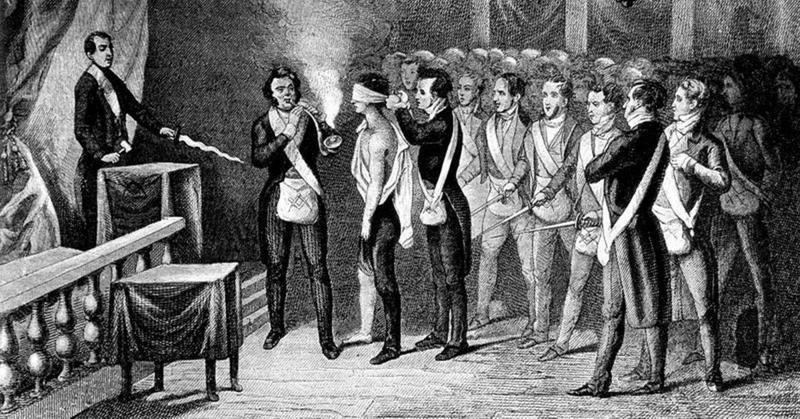The Morgan Affair: A Tale Of Secret Societies, Kidnapping, And America’s First Third Political Party
By | August 27, 2021

It might seem a little strange that the U.S. remains stuck in a two-party political system, but the circus around the creation of the country's first third party in the early 1800s might account for some gun-shyness. The rise of this third political party stemmed from a wave of anti-Masonic sentiment that swept through the nation following the "Morgan Affair," when a disgruntled former Mason threatened to expose the fraternal organization's secrets.
This Morgan Guy
It all started with William Morgan, a Virginia native who served as a captain in the War of 1812 before settling down in Canada with his teen bride. After their brewery caught fire, leaving them penniless, the family relocated to Rochester, New York, where Morgan joined the local Masonic lodge, Wells Lodge No. 282. As an exclusive organization surrounded by rumors of secret rituals that counted top political figures and prominent businessmen among its ranks, the Masons vigilantly protected their goings-on from the prying eyes of nonmembers, and Morgan's membership was in question from the start. We know that he received the Royal Arch Degrees, or York Rite, for which he must have completed the first three degrees of Freemasonry, but he had no proof of completing the first three degrees themselves.
According to rumor, Morgan talked an acquaintance into vouching for him, but whether this person actually had reason to believe him or was simply an accomplice isn't known. Whatever the case, Morgan later joined the Western Star Chapter R.A.M. No. 33 based in LeRoy, New York and became a well-known Mason in the state, giving presentations about Freemasonry and helping several Royal Arch Chapters get off the ground. In 1825, however, when he was helping to establish one such chapter in the small town of Batavia, New York, people began to question whether Morgan was truly a Mason, and he was cast out of the local chapter.

What Happened To William Morgan?
Furious at the slight, Morgan threatened to write a book exposing the Masons' secrets and even secured a few financial backers for his project, including local newspaper publisher David C. Miller, who was himself denied membership in the Masons. They soon realized that they had made some powerful enemies, as they began to suffer bizarre misfortunes. Miller's newspaper office suspiciously caught fire, although the blaze was extinguished before it destroyed his business, and then Morgan was arrested, accused of stealing a shirt and tie, of all things.
The charges were dropped, but Morgan was jailed until he could pay the $2 cost of the garments. According to reports, a group of unknown men arrived at the jail to pay Morgan's fee and bring him home, and Morgan was never seen again. Rumors swirled that the Masons drowned Morgan in the icy Niagara River, but several of the men involved insisted that Morgan was simply given money and told to head north into Canada and never return to the U.S.

The Morgan Affair
The news media had a field day with the story, which they dubbed the "Morgan Affair." Reports about kidnapping and murder plots, secret rituals, and the power of the Masons ran in newspapers across the country, thrusting the organization into the national spotlight. Public perception of the previously well-respected organization soon turned sour, especially after the three men who were arrested and charged with Morgan's kidnapping and alleged murder were acquitted by a judge who happened also be a Mason, resulting in the creation of the national Anti-Masonic Party.
The reign of the United States' first third political party was short lived. They nominated candidates for the presidency in both the 1828 and 1832 presidential elections, but they lost both times, and public interest soon moved away from the Masons and toward other issues, such as slavery. In time, the Anti-Masonic Party merged with the Whig Party, but the reputation of the Masons remained tarnished for half a century after the Morgan Affair. Their numbers also declined, but it's possible that the group simply became more selective about membership and secretive about their activities, all things considered.

